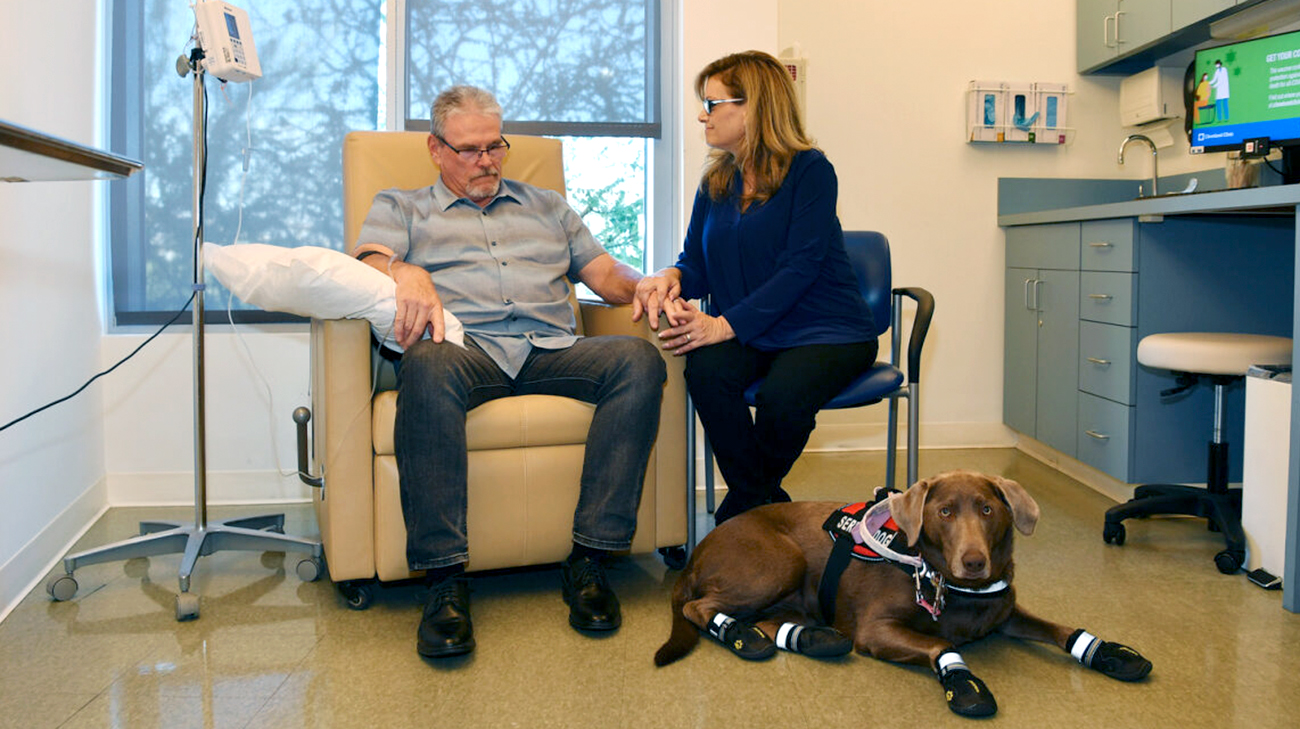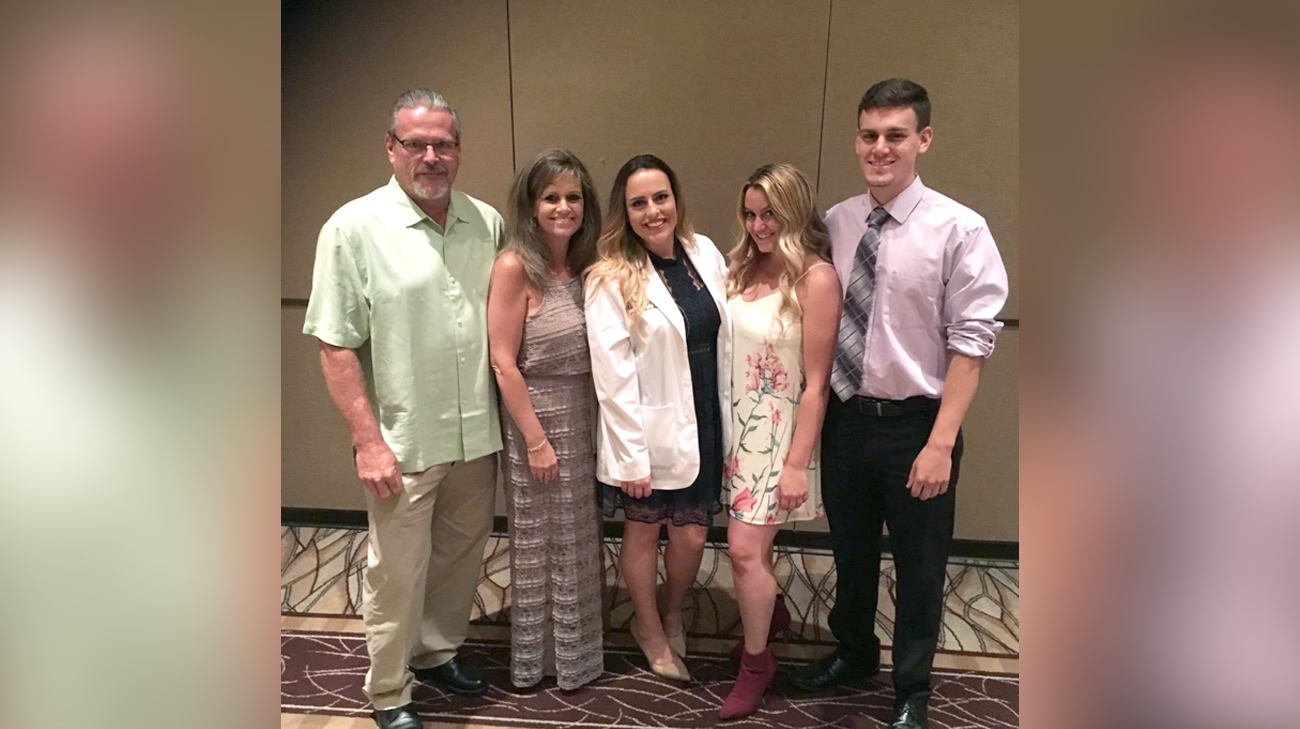Time is what Dan and Andrea Harrington want most. More time to enjoy their lives together as normally as possible, before 64-year-old Dan’s Alzheimer’s disease progresses into more severe stages of memory and cognitive decline and he becomes fully in the throes of dementia.
Married for 35 years and parents to three adult children, the couple were grateful and emotionally moved when Dan became the first patient with Alzheimer’s disease at Cleveland Clinic Lou Ruvo Center for Brain Health in Las Vegas, Nevada, to receive an infusion of the anti-amyloid drug, lecanemab, in a clinical setting. The drug, approved by the U.S. Food and Drug Administration in July 2023, is a treatment for patients with mild, early-stage Alzheimer’s disease.
“The most frustrating thing in the world is not being able to remember something when it was just told to me two minutes ago,” says Dan, who moved to Nevada, with Andrea, from southern California in 2017, specifically to be treated at the Lou Ruvo Center for Brain Health. “Now, with this drug, there's a chance I won’t get worse for a while.”
Adds Andrea, “If we get a few months more and we can continue to make memories and enjoy what we have, our prayers are being answered. We’re very, very grateful and excited at the opportunity.”

Dan and his wife, Andrea, at Cleveland Clinic Lou Ruvo Center for Brain Health in Las Vegas, Nevada. Dan is the first patient at the center to receive the drug outside of clinical research for the treatment of mild Alzheimer’s disease. (Courtesy: Denise Truscello for Cleveland Clinic)
While not a cure for Alzheimer’s disease, lecanemab has been proven to slow the progression of the degenerative brain condition, which affects 24 million people globally. The drug is effective in gradually removing abnormal buildup of amyloid beta, a protein linked to the plaques found in the brains of individuals with Alzheimer’s disease. Extensive research revealed the removal of amyloid beta for people in the earliest symptomatic stages of Alzheimer’s disease, like Dan, appears to slow disease progression.
According to neurologist Charles Bernick, MD, one of the physicians at the center who has been treating Dan for six years, “This drug is a major step in our field, probably the biggest advancement we've had in terms of therapeutics. Lecanemab is not a cure, but it is the first drug, covered by Medicare, that will modify the disease. And the earlier a patient can start on it, the better their chances may be in the long run.”
Since 2020, Cleveland Clinic researchers and patients participated in the multi-center phase 3 CLARITY study of lecanemab. Currently, as part of its ongoing research efforts, the Lou Ruvo Center for Brain Health is involved in the AHEAD trial, which is studying the efficacy of lecanemab for individuals at risk for dementia, before they are symptomatic.
Says Dr. Bernick, “If AHEAD shows a positive result, it's going to totally change how we treat the disease. We have the ability to identify individuals at risk of developing Alzheimer's. The thought is if you can treat them early, as is being done in this study, we can delay or possibly prevent the disease.”

Dan and Andrea at their daughter Ashley’s college graduation. The commencement speaker was Larry Ruvo, who founded the Lou Ruvo Center for Brain Health in 1994, after his father died from Alzheimer’s disease. (Courtesy: Dan Harrington)
Dan and Andrea learned about the center by happenstance, while attending their daughter Ashley’s college graduation from Touro University Nevada. The commencement speaker was Larry Ruvo, who founded the Lou Ruvo Center for Brain Health in 1994, after his father died from Alzheimer’s disease.
When Larry began speaking about the center, Dan and Andrea looked at one another in astonishment and began to cry. Only weeks prior they had met with a doctor to discuss memory concerns. Recalls Andrea, “I just couldn't believe it. I knew there was a reason we were sitting there that day. Mr. Ruvo was so amazing to hear, and I felt like he was talking to us.”
Soon after, the couple began making plans to move to Nevada, settling in Las Vegas, in 2017. Both were able to find jobs, although Dan had to retire after a few months due to increasing memory loss that made it difficult for him to drive to and from work. Not long after being accepted as a patient at the center, Dan was diagnosed with Alzheimer’s disease and began regular treatment.

Dan will continue receiving infusions of the medication for as long as he and his care team see fit. (Courtesy: Denise Truscello for Cleveland Clinic)
Andrea remembers their first visit. Nervous about what lay before them, the Harringtons were put at ease by the physicians and caregivers. As Andrea describes it, “All the people here are wonderful, very patient and genuine. Being here has been lifechanging for us.”
Since Dan received his first infusion on November 2, 2023, he completed his 18-month treatment plan in May 2025. Dan will continue receiving infusions of the medication for as long as he and his care team feel it’s beneficial.
"Dan has successfully completed his 18-month course of lecanemab, totaling 36 infusions,” says Maileen Ulep, PhD, APRN, who has been part of Dan’s care team. “Post-treatment amyloid PET scans show a reduction in amyloid burden compared to baseline, though the scans remain positive. Moving forward, Dan will continue with monthly lecanemab infusions as part of a maintenance therapy plan.”

Dan and his care team at Cleveland Clinic Lou Ruvo Center for Brain Health in Las Vegas, Nevada, celebrate Dan's 18-month course of treatment. (Courtesy: Cleveland Clinic)
Dr. Bernick says the decision to continue lecanemab after the initial 18 months of treatment is individualized and made jointly by each patient and their physician. Factors including a patient’s current cognitive status, overall health, age, and amyloid clearance are all taken into consideration.
“This has been such a positive experience—far beyond what I expected when I started,” says Dan. “I’ve agreed to monthly infusions moving forward so I don’t have to worry about anything coming back. For me, it’s about making memories and delaying progression. When I was first diagnosed, I felt like I was losing everything. Now, I have hope.”
Related Institutes: Neurological Institute

